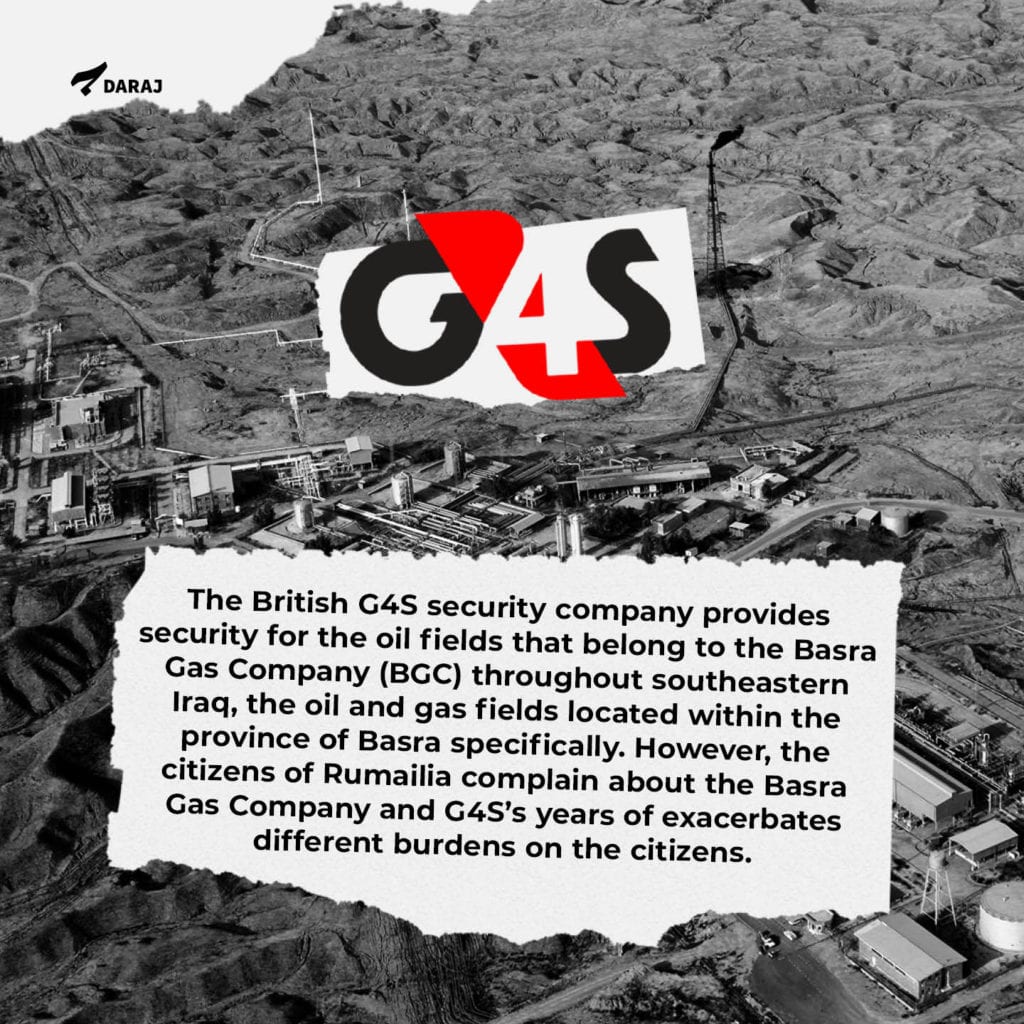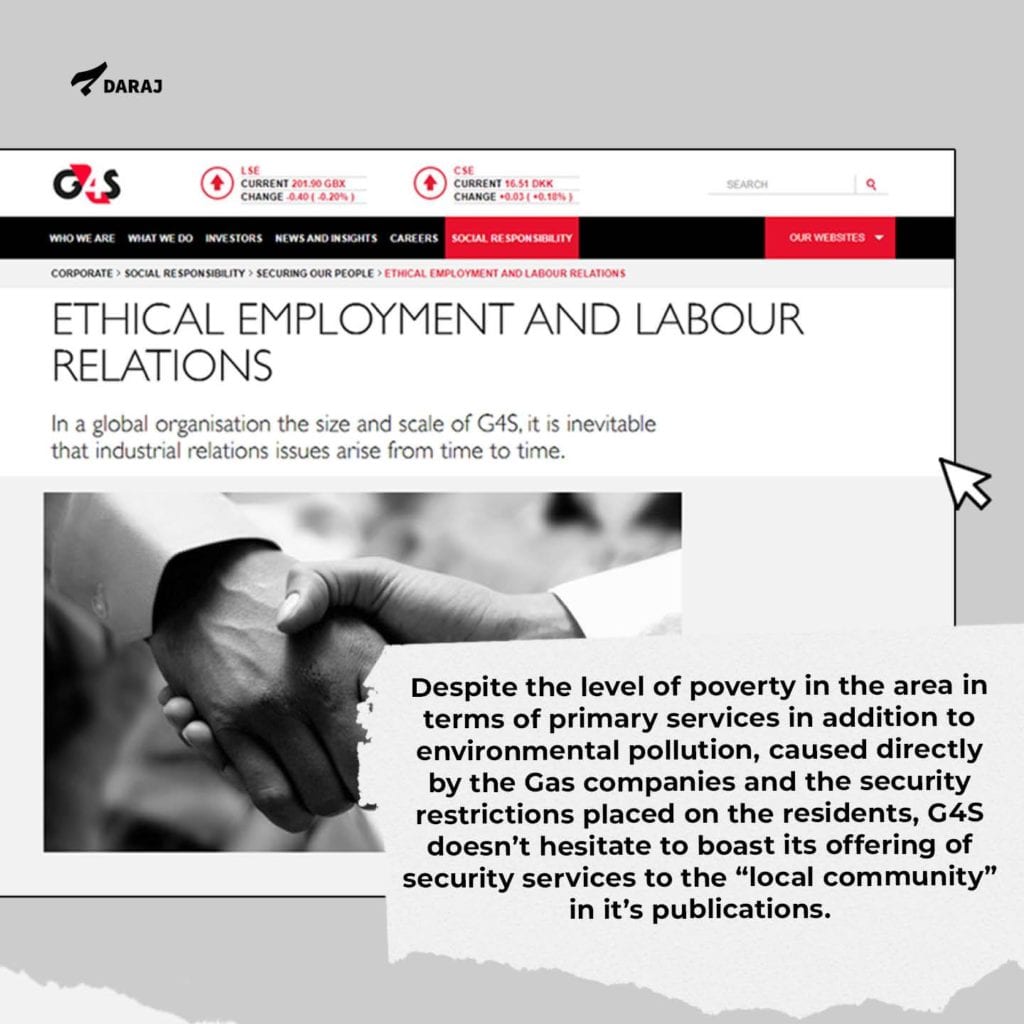Rumaila town is a southern Iraqi town that attracts major international oil companies, while its residents live in poverty and they face a fraught security situation that prevents them from building new residential homes and from restoring their old houses.
The houses are in need of renovation because construction dates back to the seventies of the last century. Rumaila town (11,000 thousand people) is known as a richest oil area in the Basra Governorate, in which giant companies such as British Petroleum, Mitsubishi and Shell operate. British security company G4S provides security for the Basra Gas Company (BGC) in Rumaila Town.
The security contract between G4S and Basra Gas Company is worth approximately $270m. While this sounds like a lucrative contract, locals are not satisfied with the situation in Rumaila.


Jawad Kadhim, a resident of Rumaila town, confirmed that basic construction materials were prevented from entering his town to construct new homes. The pretext, according to security guards, was to prevent the construction of informal settlements in the oil fields. According to Kadhim: “The houses in the town are no longer suitable for living, because they were built five decades ago and are destined to perish. The population suffers because of a poor environmental and health situation that has a direct impact on our public health.” Kadhim pointed out that families cannot buy materials for the old houses, and bring them in for construction or restoration, He further pointed out that the suffering of local people had increased because there was no sewage system, which also posed a direct threat to public health.
Basra’s Oil
The British G4S security company provides security for the oil fields that belong to the Basra Gas Company (BGC) throughout southeastern Iraq, the oil and gas fields located within the province of Basra specifically. The security company employs more than 500 security guards in Basra, 3000 in all of Iraq and it owns approximately 220 4×4 vehicles in this southern region, which is rich in gas and oil. G4S has been operating there since January 2016, under the so-called ‘special security details’. It provides protection for the Basra Gas Company employees and contractors seven days a week.
The scope of the projects of the in 2013 established Basra Gas Company – a joint venture between the Iraqi government and companies such as Shell and Mitsubishi – encompasses large geographical areas. The scope of security operations is therefore also expanding, and this had a negative impact on the lives of local residents. It is the biggest ever gas project in Iraq and one of the world’s biggest gas flares project.

In addition to obstructing construction materials and restricting the restoration of old houses, residents point to pollution problems resulting from burning gas in the oil field and the occurrence of fires during operations the security company’s vehicles which drive around 24 hours. All of this exacerbates the burden on the citizens.
A resident of the town narrated how his young daughter and other children suffered due to a large fire that broke out in 2016 in the Rumaila oil field, which led to the spread of a lot of smoke and it caused pollution in the area. This exposed a number of children to shortness of breath. The resident, who chose to go by his first name – Jaber – only, because of security concerns, notes that his daughter (Ghazal, 7 years old) suffered severe breathing problems due to the pollution, which affected her growth and today she looks much younger than her real age because of that. “My daughter’s health has deteriorated, and she cannot walk, and the problem of shortness of breath has become insufferable for her,” he said. “We demanded a modern hospital, and the companies in question responded to our request by building a mobile health center consisting of a small car carrying some medicines,” he said.
In this small town the residents struggled with pollution and the lack of primary services. On its website, G4S boasted: “G4S has driven BGC employees in excess of 19,500,000 km – the equivalent of over 20 return journeys to the moon or 480 times around the world – with no major incidents. These figures equate to working an exposed time of over 450,000 hours without major incident. Such statistics are testament to both the high levels of health safety and security required by BGC and also the ability of G4S to meet them without fail every day for over four years.”


It is noteworthy that the security forces that prevented the entry of primary construction materials into the town are local forces. However, relevant decisions always originate with G4S, according to an Iraqi security employee at G4S. This security employee, who does not want to be named for fear of being subjected to punishment, said: “In order to avoid any clashes, G4S does not have direct contact with the local community. Therefore, the company resorted to building partnership contracts with official and unofficial local security agencies”. But, according to the employee, G4S: “is the body that decides the overall security policy in this large oil field,” he said. Moreover, this Iraqi employee pointed out that the Iraqi security forces at G4S occupy a marginal place and their work is limited to guarding checkpoints, gates and dealing with the local residents.
He complained about discrimination of Iraqi employees compared to their foreign colleagues. The latter salaries range between 6000 and 8000 dollars per month, and they are former soldiers from Britain, Ireland and Scotland, while Iraqi employees receive a much lower salary even if a person occupies some of the highest positions, he said. In his view, the main problem with G4S is the Rumaila residents’ ignorance of G4S’s presence. The security forces prevent building materials from reaching Rumaila and the local residents only see security gates and checkpoints where the local police are, but G4S operates and drives the operation behind the scenes, said the former employee.


It entered into a contract with the United Nations Mine Action Service to remove mines and remove rubble on the right side of the city of Mosul at the beginning of 2019. The city was liberated from ISIS in 2017. G4S ended up offending the Syriac Catholic Archbishopric. A statement issued by the Syriac Catholic Archbishopric in the Nineveh Governorate on 01/14/2019 indicated that the demolitions “offended the sanctity of the Church of the Virgin Mary, whose founding dates back to 1858, and its religious and archaeological features were distorted, due to the removal of the rubble in a “barbaric and random” manner. This made the place lose its religious and archaeological sanctity, according to the statement.
Then there was the scandal surrounding Danny Fitzsimons. He was a G4S employee, who the company sent to Iraq while they knew he had a documented history of PTSD due to his past military experience. Fitzsimons, who according to the British media, was known for his hatred and racist past, killed two colleagues in Baghdad in 2009 and he was sentenced to 20 years in prison. He was transferred to Britain in November 2019.
G4S also provides security for Bagdad airport and that operation was also mired in controversy. Old outdated screening equipment was used, and G4S employed several members of very controversial and violent militias. These militias: “have access to all the airport’s CCTV cameras and to a limited-access road called Kilometer One that connects the runways to the airport perimeter, bypassing the security barriers,” the New York Times reported in July. Corruption was rife at the airport.
In September 2020 the G4S headquarters in Bagdad were bombed. Iraqi sources claimed that the bombing was mainly aimed at expelling G4S, so local militias could to acquire the airport contract. Although no militia or group claimed responsibility for the attack and no one was hurt, it was a clear sign that Iraqi groups want the British security provider gone. And given G4S’s presence in Basra and the rest of the country, this might not come as a surprise.
This investigation was written with support from the International Women’s Media Foundation.





